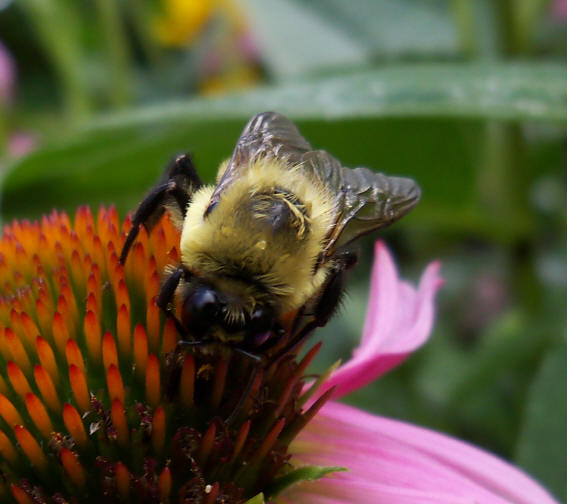
Many people, including some gardeners, tend to think of bees as the enemy. It is true that bees will sting, and some people are deathly allergic. However, did you know that if it weren't for bees, most of the food that we enjoy and rely on, would no longer exist.
Pollination, as you may know, is the process of moving pollen that allows the plant to produce a fertile seed. Some plants are self-pollinated or pollinated by wind, but the vast majority of our favorite food plants need to be pollinated by bees in order to flower and produce their product. What a world-wide disaster it would cause if we lost all our bees.
The truth is that the bee population around the world is steadily declining.
Beginning in 2006, a mysterious disease called Colony Collapse Syndrome started killing off our honey bees. Whole hives were wiped out in one season. Continuing research for the cause of the disease is still inconclusive, but unsurprisingly seems to be pointing to an accumulation of chemicals, toxins, and viruses so abundant in our environment today. Loss
of the honey bees is causing a terrible strain on our local orchard men who rely heavily on them to pollinate their fruit trees.
You may be surprised to know that the familiar and valuable honey bee is not a native bee. We actually have several thousand native bee species in the United States who are not as dramatically affected by the Colony Collapse Syndrome, probably because they are solitary bees as opposed to hive dwellers. With the dramatic decline of the honey bees, their
role in the pollination process becomes ever more important.
As gardeners and homeowners we have an obligation to protect and provide for these native bees as much as possible. Small gardens can make a difference!
If you are a backyard gardener like myself, you have probably always thought of your garden as your private little haven that doesn't make any difference to anyone else. Wrong! You are needed to be part of an important effort to save our pollinators!

Our pollinators are declining because their habitats are disappearing. Each time a housing development or superstore is built, huge areas of habitat are wiped out. What once was home to thousands of living creatures is paved over for a parking lot, and in the housing developments the new homeowners come along and plant big expanses of lawn and exotic
plants from other continents which are of no use to our native bees and wildlife. To make matters worse, a large number of these introduced non-native plants have escaped cultivation becoming invasive and crowding out the native plants in our wild areas including state parks and forests thus eliminating even more habitat area. Finally, many of those homeowners use
pesticides indiscriminately, killing off the bees that are so vital to us.
What can we do? Make your garden inviting to the bees by planting a variety of flowers for each season so that they can enjoy a continuous supply of nectar from spring through fall. Learn more about native plants, and try to include as many as possible in your landscape. Remember to include native shrubs and trees which not only support the wildlife, but
require a good bit less work on your part.
Stop using so many pesticides on your lawn and garden! If you feel you absolutely must use a chemical of some sort, first be sure you have correctly identified the problem. Contact the master gardeners at the Penn State Extension office for help with this. Next select the least toxic substance to accomplish your purpose, and third, use it before dawn or
after sunset when the bees are not active.
There are certain precautions you should take when working alongside bees. Always use unscented toiletries, and never wear perfume. Do not wear brightly colored or flowered clothing, and always move slowly and quietly when there are bees around. Swatting, running, and screaming will not produce the results you were hoping for!
Most bees nest in the ground or in hollowed out areas of trees and brush. If you are planning to clean up brush piles, cut wood, or dig out old shrubs, it is always better to do these jobs in colder weather when the bees are dormant or hibernating. My husband and I found out the hard way that if you plan to stand on a ladder and remove your house shutters
for painting, it is better to do it in the very early spring before the wasps have built their nests behind them! Disturbing a wasp nest is bad. Doing it while stuck up high on a ladder is much worse!! So use common sense and take precautions, but please invite the bees into your garden.
Now, when you sit quietly in your garden and listen to the drone of bees working, or hear the loud buzzing of a big bumble bee nearby, be proud. Feel good about the fact that you are doing your part.
Read other articles on birds, wildlife & beneficial insects
Read other articles about controlling insects & garden pests
Read other articles by Barbara Mrgich